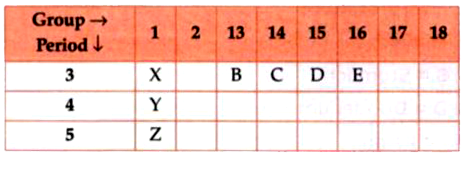An element X belongs to fourth period and fifteenth group of the periodic table. Which one of the following is true regarding the outer- electronic configuration of X ? It has
It has partially filled d-orbitals and completely filled s-orbitals.
It has completely filled s-orbitals and half-filled p-orbitals.
It has half-filled p-orbitals and completely filled s-orbitals.
It has half-filled d-orbitals and completely filled s-orbitals.
The correct Answer is:C
The electronic configuration of'X' can be written as X=1s22s22p63s23p64s23d104p3 so element 'X' has completely filled s-and d-orbitals and half-filled porbitals.
Topper's Solved these Questions
- CLASSIFICATION OF ELEMENTS AND PERIODICITY BOOK - NCERT FINGERTIPSCHAPTER - CLASSIFICATION OF ELEMENTS AND PERIODICITY EXERCISE - Electronic Configuration And Type Of Elements
20 Videos
- CLASSIFICATION OF ELEMENTS AND PERIODICITY BOOK - NCERT FINGERTIPSCHAPTER - CLASSIFICATION OF ELEMENTS AND PERIODICITY EXERCISE - Periodic Trends In Properties Of Elements
59 Videos
- CLASSIFICATION OF ELEMENTS AND PERIODICITY BOOK - NCERT FINGERTIPSCHAPTER - CLASSIFICATION OF ELEMENTS AND PERIODICITY EXERCISE - Nomenclature Of Elements
3 Videos
- CHEMICAL BONDING & MOLECULAR STRUCTUREBOOK - NCERT FINGERTIPSCHAPTER - CHEMICAL BONDING & MOLECULAR STRUCTUREEXERCISE - Assertion And Reason
15 Videos
- ENVIRONMENTAL CHEMISTRYBOOK - NCERT FINGERTIPSCHAPTER - ENVIRONMENTAL CHEMISTRYEXERCISE - Assertion And Reason
15 Videos
Similar Questions
Knowledge Check
An element X belongs to the fourth period and the fifteenth group of the periodic table. Which one of the following is true regarding the outer electronic configuration of X? It has
Ahalf-filled d-orbitals and half-filled p-orbitalsBcompletely filled s−,p−, and d-orbitalsCcompletely filled s-and p-orbitalsDcompletely filled s-orbitals and partially filled p-orbitalsAl element X belongs to fourth period and fifteenth group of the periodic table. Which of the following statements is true?
AIt has a completely filled s-orbital and a partially filled d-orbitalBIt has completely filled s- and p- orbitals anre a partially filled d-orbitalCIt has completely filled s- and p- orbitals and a half filled d-orbital.DIt has a half-filled p-orbital and completely filled s- and d-orbitals.An element X belongs to fourth period and fifteen group of the periodic table . Which of the following statements is true ?
AIt has a completely filled s- orbital and a partially filled d- orbitalBIt has completely filled s- orbital and a partially filled d- orbitalCIt has completely filled s- and p- orbitals and a half filled d- orbitalDIt has a half filled p- orbital and completely filled s- and d- orbitals .
An element belongs to third period and group 13 of the periodic table which of the following properties will be shown by the element?
View SolutionAn element belongs to 3rd period and group-13 of the periodic table. Which of the following properties will be shown by the element?
View SolutionAn element belongs to 3rd period and group 13 of the periodic table. Which of the following properties will be shown by the element ?
View SolutionAn element X belongs to group 17 and 2nd period of the periodic table. Its atomic number will be
View SolutionAn element which belongs to third period and group 16 in the periodic table has electronic configuration
View Solution

